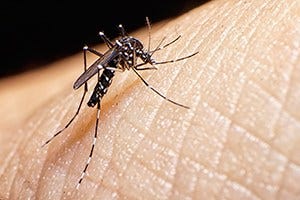Olympics Underscore Need for New Insecticides to Curb Zika
 The research has uncovered a chemical variation of an insecticide—currently used to control ticks in cattle—that can kill mosquitos.
The research has uncovered a chemical variation of an insecticide—currently used to control ticks in cattle—that can kill mosquitos.
Subscriber Benefit
As a subscriber you can listen to articles at work, in the car, or while you work out. Subscribe NowWith the 2016 Summer Olympics just days away in Rio de Janeiro, the Zika virus outbreak has captured headlines and emphasized the importance of finding new strategies to battle mosquito-borne diseases. Researchers at the University of Notre Dame say targeting mosquitos is the best way to wage war on the Zika virus. A recent grant from the Department of Defense is funding the Notre Dame scientists as they search for better solutions that could reach far beyond the Olympics.
“Zika is certainly concerning, but it will likely be like the West Nile virus that has waves of infection throughout the world,” says co-principal investigator and Notre Dame Biological Sciences Associate Professor Dr. Mary Ann McDowell. “Emerging diseases like Zika are definitely a problem, and they keep re-emerging or rising, so the control of mosquitos is important, whether it be Zika, dengue fever, malaria or yellow fever.”
Because Zika virus infection in a pregnant woman can cause serious birth defects, the Centers for Disease Control and Prevention is advising pregnant women not to go to the Olympics and for all Rio travelers to “practice enhanced precautions.” New data from Notre Dame’s Eck Institute for Global Health projects that as many as 93 million people in Latin America and the Caribbean are at risk of infection over the next two to three years.
“Mosquitos are the emphasis—if we can reduce the population of mosquitos, you significantly reduce the disease,” says Dr. Zain Syed, a Notre Dame biological sciences assistant professor and co-principal investigator.
The recent $418,000 grant is a follow-up to an earlier $3 million grant that helped the researchers screen for new insecticides. Through collaboration with the Eck Institute, McDowell and Syed will use the latest dose of funding to further investigate a compound they identified that’s showing promise. McDowell says their research has uncovered a chemical variation of an insecticide—currently used to control ticks in cattle—that can kill mosquitos.
“Our hope would be, eventually, that we could make designer insecticides that maybe just target mosquitos and not other [beneficial] insects, like honeybees,” says McDowell. “That’s very difficult to do, but if you can accomplish that, then you might be able to stop some of the rise in insecticide resistance due to using pesticides for agricultural purposes.”
The team’s recent studies have shown the compound does, in fact, kill resistant mosquitos. The scientists say the university’s Warren Family Research Center for Drug Discovery and Development is streamlining their work. The center is now able to make compounds that McDowell previously had to order—sometimes from overseas.
“That’s a great step forward for us here at Notre Dame—to have that synthesis capability in-house,” says McDowell. “That’s what centers and universities are for: bringing different people together with different expertise to move something forward. The system is working. That’s good.”
For example, Syed’s expertise include mosquito behavior, and his lab has uncovered that the compound impacts mosquitos’ behavior in an important way.
“If, somehow, we can block the sense of smell in mosquitos, then they might not be able to find humans [to bite],” says Syed.
The overall goal of the Department of Defense grant is to develop insecticides that could protect military personnel in less-developed countries where mosquito-borne diseases are a significant threat. The researchers say, more broadly, such discoveries could impact global health.
“I’m excited about the possibilities of finding something that could help mankind in some way,” says McDowell. “I think that’s what drives all of us, especially at Eck—to be a service to society.”
McDowell says the Zika virus outbreak has impacted federal funding agencies.
McDowell says the Warren Center’s ability to produce compounds for testing streamlines her research.
Syed says the collaboration for the project is “quite exciting.”

